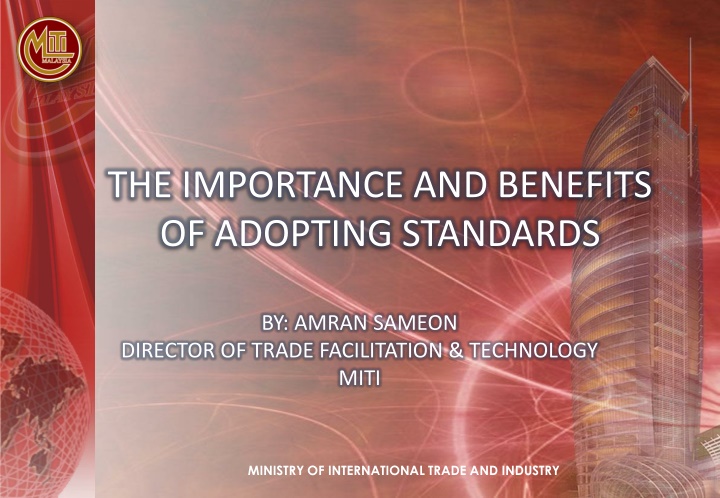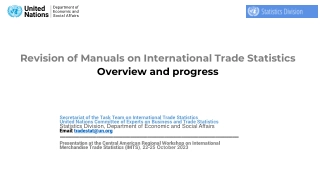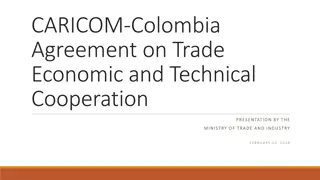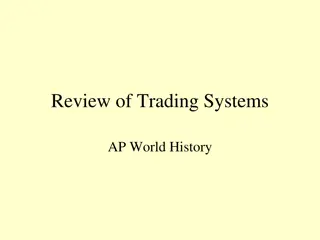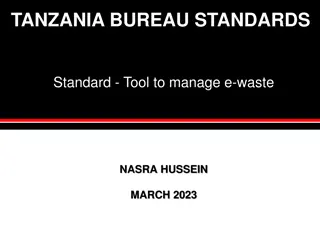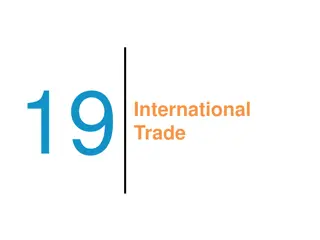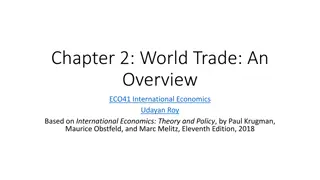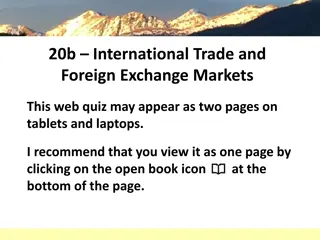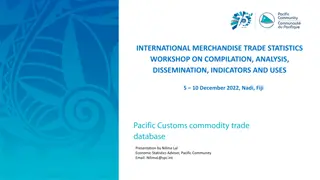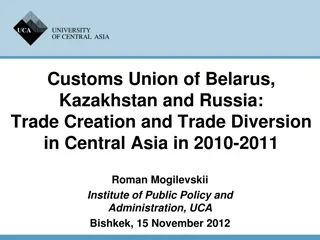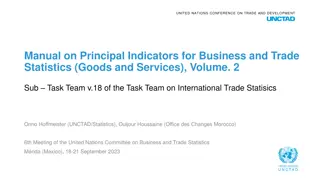Importance & Benefits of Adopting Standards by Amran Sameon, Director of Trade Facilitation & Technology
In this article, Amran Sameon, the Director of Trade Facilitation & Technology at the Ministry of International Trade and Industry, discusses the significance and advantages of implementing standards in various sectors. He highlights the positive impacts of adherence to standards on trade, industry, and technology, emphasizing the importance of ensuring quality and consistency. By adopting standards, businesses can enhance efficiency, build trust with consumers, and improve competitiveness in the global market.
Download Presentation

Please find below an Image/Link to download the presentation.
The content on the website is provided AS IS for your information and personal use only. It may not be sold, licensed, or shared on other websites without obtaining consent from the author.If you encounter any issues during the download, it is possible that the publisher has removed the file from their server.
You are allowed to download the files provided on this website for personal or commercial use, subject to the condition that they are used lawfully. All files are the property of their respective owners.
The content on the website is provided AS IS for your information and personal use only. It may not be sold, licensed, or shared on other websites without obtaining consent from the author.
E N D
Presentation Transcript
THE IMPORTANCE AND BENEFITS OF ADOPTING STANDARDS BY: AMRAN SAMEON DIRECTOR OF TRADE FACILITATION & TECHNOLOGY MITI MINISTRY OF INTERNATIONAL TRADE AND INDUSTRY
OVERVIEW Background Development of standards Importance of standards Benefits of adopting standards Institutional Framework Recommendation Next Step Conclusion 2
BACKGROUND The progressive liberalisation of trade in goods and services will open up more markets for export of goods and services from Malaysia. The growing numbers of Free Trade Agreement (FTA) give more favourable treatment such as: Lower or zero tariffs for goods; Removal of quantitative import restrictions; Trade facilitating customs procedures; and Predictable and conducive environment for investment. 3
BACKGROUND Influx of products into the country which are not subjected to standards will affect health, safety and environment. 4
DEVELOPMENT OF STANDARDS As of November 2011, a total of: 6,367 Malaysian Standards (MS) have been developed; 3,855 standards (60.6%) are aligned with international standards; and 332 standards (5.21%) have been made mandatory to both imported and locally manufactured products . 5
DEVELOPMENT OF STANDARDS From 1 January 31 October 2011, the sales of MS are as follows: Sales of MS online 1858; Sales of MS hardcopy 9062; and Total : 10,920 6
THE IMPORTANCE OF STANDARDS Third Industrial Master Plan (IMP3) Standards conformance is important for industrial efficiency, productivity and competitiveness. The linkage between the international market access and compliance to standards could pose challenges to Malaysia exporters in terms of their readiness and capacity. 7
THE IMPORTANCE OF STANDARDS New Economic Model (NEM) need to adopt international standards and best practices to strengthen private sector. Malaysian manufacturer and service provider must comply with international standards to prosper in an integrated global market. 8
THE IMPORTANCE OF STANDARDS Rancangan Malaysia Ke-10 (RMK10) In RMK10, the private sectors are encouraged to meet Malaysian Standards (MS) and International Standards in supporting innovation led economy, for the ecosystem to unleash the economic growth. Standards compliance will also lead to build environment that enhances quality of life. 9
BENEFITS The benefits of industries to comply with standards are: Safeguard product quality, safety, technical standards in order to meet health, safety and environment requirements Customers look for the independent verification that technical standards provide. Certification marks earned by businesses whose products and practices consistently stand up to examination are instantly recognizable and act as respected badges of quality, safety and performance. 10
Provide a greater accessibility to the international market The World Trade Organisation (WTO) ensures that any standards to be imposed on products will not restrict trade and act as a discriminatory and not based on any scientific basis, by setting certain ground rules. The WTO Agreement on Technical Barriers to Trade (TBT Agreement) regulates the use of voluntary standards and mandatory technical regulations governments of WTO member countries, but also to national standard-setting organisations and NGOs within a member s territory. All WTO members are responsible to ensure that their respective national standard-setting organisations and NGOs does not use standards as a protection instruments which discriminate or discourage trade in product. not only to national 11
The ability to demonstrate compliance with widely recognised and respected standards is an effective means of differentiation in a competitive marketplace. Manufacturing products or supplying services to appropriate standards maximises their compatibility with those manufactured or offered by others, thereby increasing potential sales and widespread acceptance. 12
Ensure Malaysian manufacturers are able to produce high quality of products which are aligned to the international standards For businesses, the widespread adoption of International Standards means that suppliers can develop and offer products and services meeting specifications international acceptance in their sectors. that have wide Therefore, businesses using International Standards can compete on many more markets around the world. 13
Protect the interests of consumers As consumers become increasingly informed about their choices, conformity to recognised standards becomes pivotal. For customers, the worldwide compatibility of technology which is achieved when products and services are based on International Standards gives them a broad choice of offers. They also benefit from the effects of competition among suppliers. Conformity of products and services to International Standards also provides assurance about their quality, safety and reliability. 14
INSTITUTIONAL FRAMEWORK Several committee has been established over the years to ensure the smooth development and implementation of standards. Among others are: Committee on Mandatory Industrial Standards (CMIS) chaired by MITI. Jawatankuasa Mandatori (JPPSM) chaired by MOSTI. Penyelarasan Pelaksanaan Standard Industrial Standards Committee (ISC) SIRIM as secretariat. 15
1) Committee On Mandatory Industrial Standards (CMIS) CMIS was established in 2007 with the objectives to identify and coordinate mandatory standards for manufactured products with a view to promote quality and safety. CMIS comprises of five task forces namely: building material; machinery and equipment; automotive part and component; wire and cable; and medical devices. 16
Membership MOSTI, KPDNKK, MOT, AG Chambers, STANDARDS MALAYSIA, Customs, SIRIM Berhad, SME Corp., Energy Commission (EC), Department of Occupational Safety and Health (DOSH), CIDB, FMM and other relevant agencies/industry representatives. CMIS is to meet at least once in three months (4 times a year). 17
2) Jawatankuasa Penyelarasan Pelaksanaan Standard Mandatori (JPPSM) JPPSM was established under Ministry of Science, Technology and Innovation (MOSTI) chaired by KSU MOSTI in 2011. The functions of JPPSM includes: co-ordinate effective implementation in enforcement of mandatory standards and technical regulations; and ensure that all enforcement of mandatory standards and matters related to technical regulations are in line with national policies. 18
3) Industrial Standards Committee (ISC) 23 Industrial Standards Committee (ISC) including Food and Agriculture ISC(A), Chemical and Materials ISC(B), Environmental Management ISC(Z), etc. The responsibility of the ISCs include overseeing effective development of standards, standardisation as well as to approve technical content of a draft standards. monitoring international 19
RECOMMENDATION Industries are encouraged to use these committee as a platform to raise any issues on development of standards, trade and industry matters, as well as any incentives needed. Communication channel between the industry, government agencies as well as regulatory body must also be utilised as to ensure local industries stay alert to the international trend of doing business as well as development of standards. 20
RECOMMENDATION There are needs for the industries to be more active in the standards setting activities, for instance trade related programmes. It is to ensure that our local industries stay competitive in the global market. 21
NEXT STEP Government will assist the industries by: Alignment to international standards provide assistance to industry by ensuring its readiness and capacity to meet international standards. Development of Standards expedite the development of standards especially for critical products that need to be made mandatory to prevent sudden surge of other products which has adverse effect on domestic industry 22
NEXT STEP Mutual Recognition Arrangement (MRA) facilitate the industries in conducting testing and accreditation process including reducing cost of doing business 23
CONCLUSION It is obvious that the role of standards has extended beyond a set of rules to be followed. It needs proper strategy and strong support from industry to take Malaysian Standards to a higher level and meet the current trend of doing business. 24
THANK YOU 25 25
